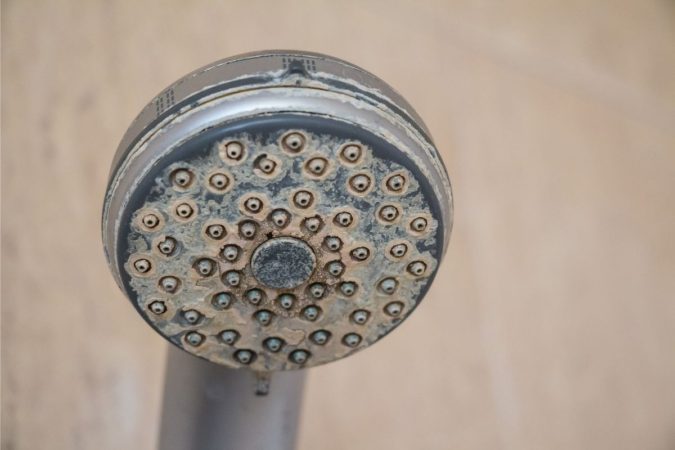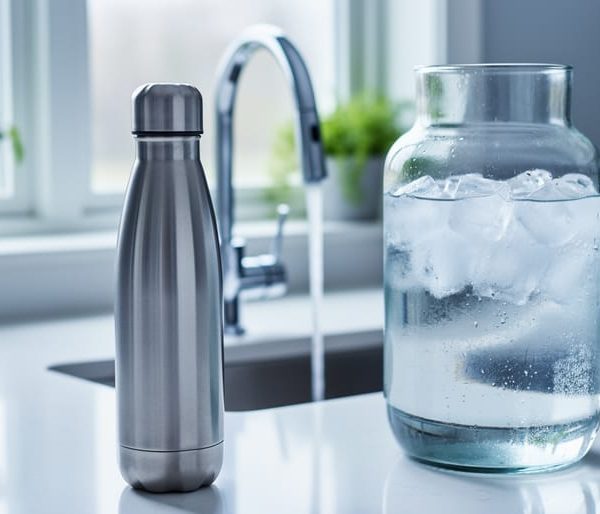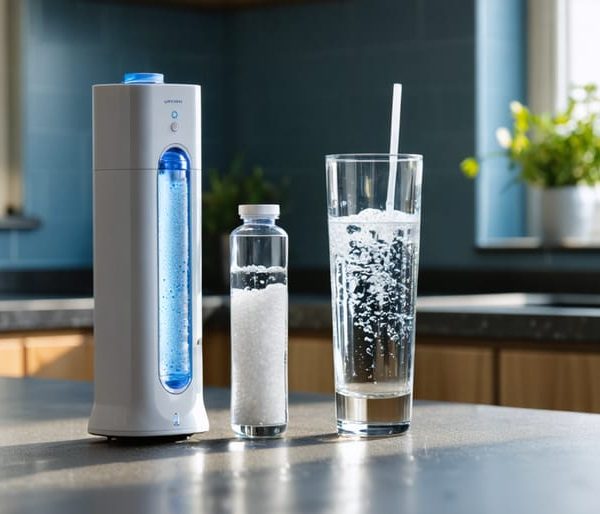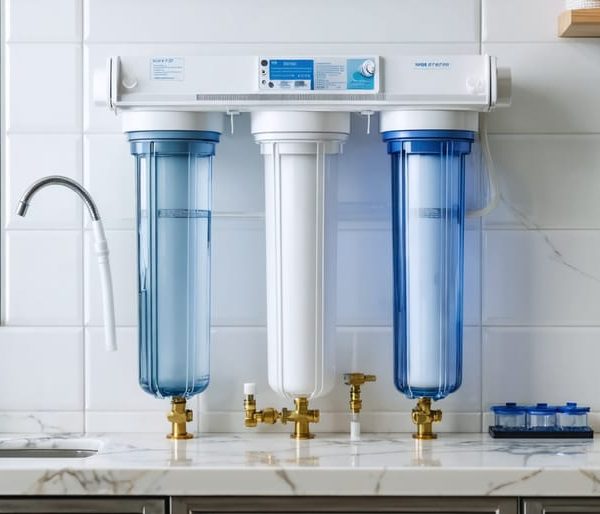Not every household needs a water softener, however, if you notice a bad taste or milky look in your water, you should consider testing your water hardness.
Water hardness in households is a more common issue than you think and can be the reason for the formation of scales on surfaces and pipes, spotted dishes and glassware, a plumbing system constantly breaking down, and itchy hair and skin. Hard water contains calcium and magnesium ions, hence the need for water softening systems.
Let’s start by understanding how to detect water hardness.
Indications Your Water Is Hard
Scale Buildup on Surfaces, Pipes, and Appliances

When your home is receiving a regular supply of hard water, the strong presence of the calcium and magnesium ions it contains will gradually appear on surfaces, pipes, and appliances around your home. Appliances such as your washing machine, dish-washing machine, and your water heater will show scale buildup.
Aside from this being an eyesore, there’s also the issue of these scales partially blocking your pipes, which means lesser supply. This will then require you to hire a plumber. The bicarbonates of calcium and magnesium form scales, which are chalky white in appearance. A water softening system can fix this.
Your Skin and Hair Are Itchy and Feel Flaky
Using hard water to shower regularly will cause your hair and skin to itch. It can also feel coarse or rough and even dry. Unfortunately, there’s little your soap or hair shampoo can do about it. This is because hard water isn’t friendly to the skin, and it’s also not friendly to soap. So your soap will have little effect on your skin as long as you use hard water to rinse it out. A water softener uses the ion exchange process to remove certain minerals causing water hardness and releasing sodium in their place.
Your Clothes Fade Easily
There is always the chance that washing clothes will fade the color of your clothes because your washing soap and laundry detergents are harsh on the fabric. But are you also sure it isn’t your water? Soft water is friendly on the clothes, just as it is on the skin. Hard water has the opposite effect on your clothes.
Due to the high mineral deposits contained in hard water, they not just wash your clothes but wash off the colors in them as well. On top of that, your clothes will also feel less comfortable on your skin when you wear them because they will be coarse. When you notice this, you need a water softener system.
Your Plumbing System Is Always Faulty
This will be a more common problem if you use steel pipes for your water supply. They easily get faulty due to the formation of scales and can’t convey as much water as they should.
Water softeners are essential because they prevent excessive plumbing repair, making you spend much more. Furthermore, it means the chances of water leakage on surfaces and in your water-based appliances are lesser. Plus, repairing too frequently can cause a strain on your entire plumbing system.
These are the things that can happen if you ignore the usefulness of water softeners to treat hard water in your home.
Reasons Why You Need a Water Softener
1. Softener Prevents the Impairment of Heater and Other Appliances
Soft water is easier to heat than hard water. When your water supply has been treated with a water softener, it means calcium and magnesium in the water have been exchanged for sodium or potassium. This produces soft water.
When hard water is boiled, it accelerates the development of scales in the piping of your appliance. This will significantly decrease the efficiency of your hot water heater and will lead to an accumulation of mineral ions in washing machines and other appliances, making it harder for water to flow through. Eventually, this will shorten the lifespan of your appliance.
2. Improved Water Quality
One of the components of water softeners is a sediment filter. It extracts harmful contaminants from the gallons of water supplied to your home. Water softeners usually filter hard water first before softening them so that these sediments contaminating the water don’t impair them.
So besides getting rid of the hardness of your water, they also improve water quality as it is healthier and much cleaner. Hard water that has passed through water softeners can even serve as drinking water. This particular benefit of water softeners parallels the reverse osmosis system.
3. Less Daily Intake of Magnesium and Calcium
Traditional water softeners use the ion exchange process to swap certain minerals for sodium or potassium. So this eliminates the tendency that your drinking water is increasing your daily intake of these mineral ions.
Although the degree to which water hardness is treated depends on the capacity of the softener, their capacities can be measured in grains per gallon. The grains per gallon denotes the unit of water hardness.
You may want to argue that a softener strips the water of vital minerals, but the truth is these minerals are not organic. Therefore, they can’t be easily absorbed by our bodies. Consequently, it’s advisable to get a water softener to extract those hard water minerals from your gallons of water.
4. Soft Water Is Great for the Skin
If you want to take your skincare seriously, you should avoid bathing with hard water. This is where a softener comes in. When you bathe with soft water, your skin feels velvety and smooth. This is because your skin pores are unclogged, and your body’s oils have been released.
When you shower with hard water, the reverse is the case. Your skin will feel dry because your skin pores are clogged. It’s a similar feeling to bathing in hot water. Hot water tends to make the skin feel itchy after bathing. In addition, the hardness of your water can leave mineral content dehydrating on your skin.
5. Fewer Expenses on Plumbing Repairs
You’ll spend less than you would’ve spent fixing leaky pipes because of the presence of scales that constricts water passage. A whole-house water filter systems from Springwell or other major water filtration brands are budget-friendly in the long run. The only expense involved will be the cost of maintenance.
6. Lower Water Bill
Also, you won’t pay as much as you would’ve paid for your water bill if you were using hard water. This is because softened water is easier to use in washing, bathing, and cooking. It’s also soap-efficient, meaning you wouldn’t need to use as much soap.
7. Enhanced Water Quality
The ability of your softener to extract certain sediments and contaminants makes your water have a better odor, color, and taste. Unfortunately, discolored and bad-smelling water can wreak untold damage on your home, from ruined clothes to spotted surfaces everywhere in the house.
The water will be pretty much useless as you can’t use it for cooking, bathing, washing, and certainly not drinking. So if you have these kinds of water problems, a water softener is recommended.
8. Boosts Hair Health
Soft water is good for the hair as well because your hair will be softer and look more healthy. In addition, using soft water prevents your hair from losing its shine, strength, and moisture.
The presence of certain minerals in your hair can make it look unhealthy. This can lead to different cosmetic procedures to rectify it when the problem is from your water. A water softener prevents this from happening, which means you don’t need to worry about what hair products will restore your hair’s shine and strength.
9. A Happier Kitchen
For some individuals and households, the kitchen is the most sacred room in the home. So it’s only natural they will be bothered when they see spotted kitchenware (pots, glass cups, and plates).
Hard water leaves spots on your kitchenware due to its rich mineral content, which will remain on the surface of your kitchenware after washing them.
With a water softener installed, this issue will be tackled. You wouldn’t need to worry about spotted kitchenware. Plus, your water is also much better for cooking because the quality has improved.
Conclusion
A lot of avoidable household problems are due to the supply of hard water. The presence of scales in your pipes, appliances, and surfaces, your hair and skin feeling itchy and flaky, your clothes fading easily and not lasting as they should, and your plumbing system is constantly flashing distress signals are the signs of hard water.
Consider a water softener to prevent the impairment of your water heater and other appliances, filter out contaminants, lessen the intake of certain minerals, boost your skincare and hair, save money long-term, enhance water quality, and for the well-being of your kitchen.



